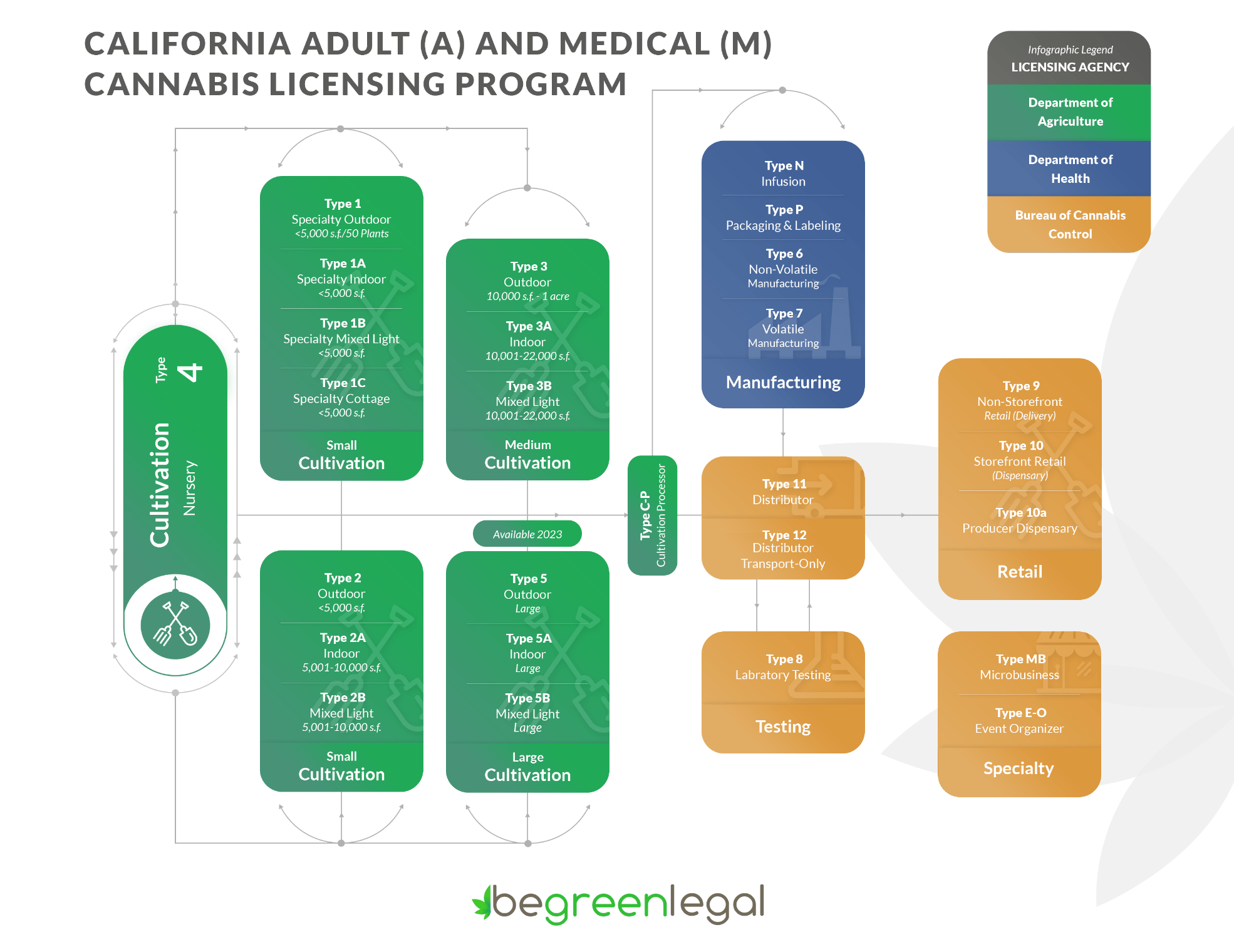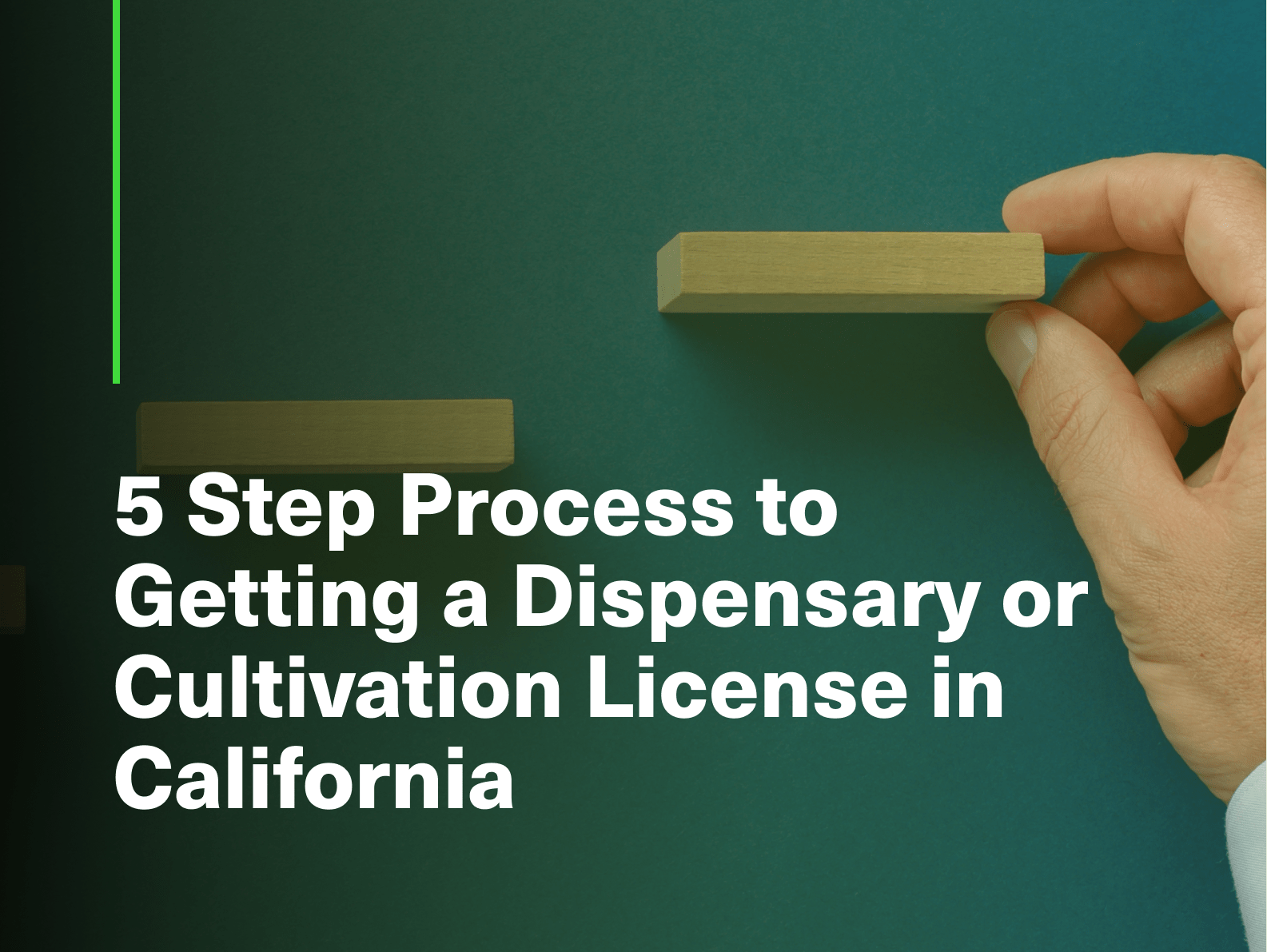The State of California released its much-anticipated urgency regulations for cannabis licenses in late November 2017 that finally establish the details of how marijuana dispensaries, cultivators, manufacturers, and distributors will need to operate. Along with this new information, the three state agencies issuing cannabis licenses (Bureau of Cannabis Control (BCC), Department of Food and Agriculture (DFA), Department of Public Health (DPH)) have introduced four new licenses, bringing the total to 26 cannabis licenses that regulate a variety of activities across the cannabis industry.
The BCC is now issuing cannabis licenses to three new categories of activities, including non-storefront cannabis dispensaries, transport-only distributors, and event organizers. Non-storefront cannabis dispensaries, also known as delivery services, now have a clear avenue for obtaining a Type 9 Cannabis License, after years of discussion with constituents. Previous draft regulations and policies only allowed deliveries from storefront marijuana dispensaries, which greatly diminished the likelihood that cannabis retail would be allowed in many of California’s cities and counties. Storefront dispensaries tend to be more controversial approvals at the local government level because they are open to the public, create additional traffic from the immediate area, as well as the region, and are more conspicuous to criminals. While there are clearly benefits to allowing storefronts, especially in cities looking to bolster local shopping and fill vacant retail spaces, many cities are currently hesitant to allow them because they do not want to be viewed as the “pot city”. In contrast, allowing non-storefront marijuana dispensaries that are not open to the public and only deliver to physical addresses in the city alleviate these fears.
Another license has been resurrected from the original marijuana law (MCRSA) passed in 2015. Marijuana cultivators, manufacturers, and dispensaries now have the option of obtaining a Type 12 Distributor Transport-Only, cannabis license that will allow these operators to transport wholesale cannabis products and immature marijuana plants (clones) to other wholesale licensees. For example, cultivators will now be able to transport their own non-manufactured cannabis flower and trim to manufacturers and distributors. Similarly, volatile and nonvolatile cannabis manufacturers will have the option of transporting their own products to a distribution center, rather than paying a fee to a distributor for this service. Nursery marijuana cultivators growing immature plants and seeds will be able to transport their products to other cultivators and distributors, as well as directly to retailers selling clones and seeds to the public. Additionally, these new cannabis licenses allows stand-alone transporters to provide courier services to the industry. This last change will likely prove significant as the previous license model required distributors to transport all cannabis products in the state. However, transporters can only move and store wholesale cannabis products between cultivators, manufacturers, and distributors. Only Type 11 Distributors can conduct the required quality assurance, testing, and packaging processes on cannabis products and transport those products to retailers.
A third new license offered by the BCC will be issued to event organizers, which are further categorized as organizers operating less than 10 events per year and those operating more than 10 events per year. The cannabis industry has flourished recently with many types of events where cannabis products are present, including cannabis cups and other types of competitions, as well as festivals, and farmers markets. It is likely that many more types of events will be created by entrepreneurs in the coming years, including resorts oriented to cannabis, touring facilities, and many others.
Finally, the DFA has created a new cannabis cultivation license oriented to businesses that provide trimming, processing, packaging, and labeling services to other cultivators. We have coined this license as Type C-P Cultivation Processor, as it has not been given a license type letter or number. The C-P license is for businesses who do not cultivate, but have set up their operations to employ regular staff and machinery used to trim cannabis flower, collect trichomes containing cannabinoids that fall off during trimming, sort and store cannabis trim material to be used for manufacturing, and package and label flower for retail sales. While many larger cultivators may perform these activities themselves, small to mid-size cultivators will likely find that working with a processor reduces stress and cost, as employing temporary staff or purchasing expensive machinery makes more financial sense if these resources are regularly used.
For more information on how cannabis permitting and licensing works in California, please visit our website and download our eBook “7 Proven Steps for Successfully Obtaining Your Cannabis Business Permits and Licenses”.




